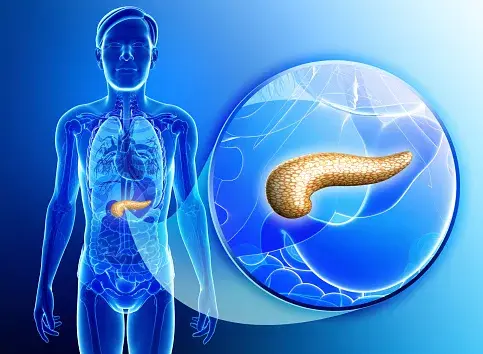The pancreas is a long, flat gland in the body tucked behind the stomach in the abdomen. It is six inches long and saturated toward the right side. This is connected to the small intestine, and the primary exercise of the pancreas is to produce enzymes that can help in the digestion of food. Therefore, the natural part of the pancreas can make the enzyme that can help get the food digested. This increase is also responsible for the production of a hormone called insulin that processes sugar and can help in the digestion of food and produce the hormones to form insulin cells that process sugar and glucose. Therefore, improper functioning of the pancreas can be associated with interrupting the many digestive functions, resulting in several problems. In this blog, we'll explore 7 symptoms of pancreas problems. These symptoms include abdominal pain, nausea, vomiting, diarrhoea, weight loss, jaundice, and digestive problems.
Problems Associated With Pancreas

A pancreas problem can occur when it produces digestive enzymes but cannot release them into the bossy. These enzymes accumulate in the pancreas by themselves. They can irritate the cells, leading to two types of diabetes, cystic fibrosis and pancreatic cancer, and the pancreas problems like type one and type 2 diabetes. Another problem can be due to the development of tumours in the cells. The most common care of tumour cells arises in the pancreatic duct.
Also Read: 5 Major Causes of Digestion Problems
7 Symptoms of Pancreas Problems
By understanding these 7 symptoms of pancreas problems, you can take steps to recognize and manage pancreas problems and improve your overall health and well-being. Whether you have a history of pancreatic problems or are simply looking to learn more about pancreatic health. The following are the pancreas issue symptoms:
1. Unexplained weight loss
Those who suffer from the chromatin of the pancreatic tend to lose weight rapidly, and even though their eating habits are normal and healthy, the body keeps losing weight, and this can become the body unable to produce enough pancreatic enzymes to help digest food once this can result in a lack of digested food, malnutrition, lack of nutrition, or unexplained weight loss.
Also Read: How to Overcome Your Habits and Stop Eating Junk Food?
2. Pain in the stomach
Abdominal pain can be first associated with the condition of the intestine or stomach, and this can usually be a diet to eat the upper abdomen that pains the pancreas; regarding pancreatic problems, that can be the immediate remedy to place a heating pad in the area of pain for about 15 to 20 minutes. You can also try to lie on one side of the pancreas, not flat, so digestion is more straightforward.
3. Rapidly increased heart rate
Experts have shown that the association between pancreas problems and cardiovascular activity can be similar to hypertension and ischemic heart disease, and these can be an individual's rapid increase in heart rate. Hence, patients with an increase in heart treatment can be associated with the development of rapid heartbeat.
4. Swollen and tender abdomen
Some of the experiences performed by the scientist can show that a tender abdomen can have chronic pancreatic and other problems like the symptoms mentioned here. Apart from that, there can also be swelling in the stomach. This can be due to bloating and swelling. Other symptoms can be tenderness of the abdomen when touching the core. Sometimes it can lead to the development of peripancreatic fluid collection and can lead to a pseudocyst.
5. Fever
There can be inflammation in the liver which can cause an increased rate of infections. This infection can lead to sudden inflammation of the pancreas. This can lead to fever or other conditions of the liver or pancreas. Though in case you have a high fever and it is persistent, it is essential to get in touch with your doctor.
Also Read:Fever: Is it a Symptom or a Disease?
6. Nausea and vomiting
Nausea and vomiting can be the common symptom of the pancreas and the problems associated with the pancreas. The primary reason is indigestion and the lack of production of enzymes required to develop problems with the stomach, intestines, or the body. Nausea or the effects of vomiting can also be due to infections. Thus, it becomes essential to get in touch with the doctor.
Also Read: Tablets For Cold and Flu
7. Diphtheria
Many pancreatitis patients experiencediarrhea and constipation frequently, leading to diphtheria. This can happen due to insufficient digestive enzymes not secreted by the intestines. This can result in major loose or smelly and oily stools that can result in problems in the intestines and issues with the excretion of the digested foods.
Also Read: Foods That Cause Acid Reflux: What You Need to Know
How can one develop symptoms of pancreas problems?
Causes of pancreas problems can be :
- Alcohol- drinking regularly or too much alcohol can lead to pancreatic problems.
- Smoking - similar to drinking alcohol - can also result in the development of many pancreatic problems.
- Medications that can irritate the pancreas-mediation can also result in different problems. Thus, it becomes essential to understand the condition and get a checkup done to deal with the pancreas problem.
- High triglyceride levels in the blood- if there is an increase in the ranks of triglycerides in the body, that can also be associated with concrete problems.
- Intestinal infections- sometimes, the spread of infection from the intestines to the liver can result in intestinal disorders.
- Metabolic disorders like diabetes - many diseases like diabetes can also result in the development of less and less production of insulin, which can result in pancreatic problems.
- Genetic disorders like cystic fibrosis - the development of excess fluid that can make it difficult for ligands to breathe can also result in pancreatic problems.
- Injury in the abdomen.
- People who are obese or have a higher BMI are also prone to pancreatic diseases.
- Genetics also plays an important role in pancreatic diseases, and people with a family history of pancreatitis have higher risks.
Conclusion
Pancreatic problems can start with a small stone or tumours and cysts. They can be left unnoticed, leading to severe diseases related to a complication of pancreatic diseases, kidney failure, and birth problems. These can also include malnutrition, breathing problems, urine, and diseases or diabetes. It comes with the quick movement of people, which can become a chronic problem related to smoking and drinking, for those with a family history are more likely to develop pancreatic issues. Recognizing these 7 symptoms of pancreas problems is crucial for maintaining good health. However, a balanced diet and regular exercise can help avoid these problems.
Also Read: Tips To Help You Breathe More Easily
Frequently Asked Questions
How to check the pancreatic problem?
There can be a blood test to look for elevated levels of a pancreatic enzyme which can be detected by increasing the level of blood cells and kidney functions.
Can pancreatic problems be cured?
There is no cure for chronic pancreatic problems, and they can be related to pain, and symptoms managed or even prevented. These can be most often caused by drinking abstinence and alcohol to ease the pain.
What are the three diseases that can affect the pancreas?
The diseases that can affect the pancreas are pancreatitis and chronic cancer or cysts. Another can be a tumor of the pancreas along with bile duct disease.
What are symptoms of pancreas problems?
Some common symptoms of the pancreas can be abdominal pain that can radiate in the back and other symptoms.

Reviewed by







